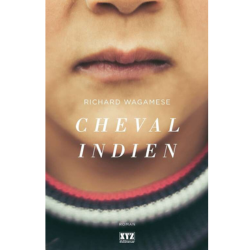
L'auteur Richard Wagamese a écrit : « Tout ce que nous sommes est une histoire. Depuis le moment où nous sommes nés jusqu'au moment où nous poursuivons notre voyage spirituel, nous sommes impliqués dans la création de l'histoire de notre temps ici. C'est avec cela que nous arrivons. C'est tout ce que nous laissons derrière nous. » Pour le Mois du patrimoine autochtone, nous voulions partager des livres pour enfants, adolescents et adultes qui capturent des histoires par et sur les peuples autochtones.
Le chandail orange de Phyllis par Phyllis Webstad
Quand Phyllis était une petite fille, elle avait hâte d?aller au pensionnat pour la première fois. Sa grand-mère lui a acheté un chandail orange éclatant qu?elle aimait et elle l?a porté pour aller à l?école la première journée. Quand elle est arrivée à l?école, on lui a enlevé son chandail et on ne lui a jamais redonné. Ceci est l?histoire vraie de Phyllis Webstad et l?histoire de la Journée du chandail orange, qui pour tous les Canadiens est une journée pour réfléchir au traitement réservé aux peuples autochtones et au message « Chaque enfant compte ».
Nokomis et la marche pour l'eau (Petit tonnerre) par Joanne Robertson
Nokomis Josephine Mandamin, une grand-mère ojibwe, marche pour sensibiliser les gens à la nécessité de protéger Nibi, un geste primordial pour les générations à venir et pour toutes les formes de vie sur la planète. Accompagnée de femmes, d’hommes et de jeunes, Nokomis a fait le tour des Grands Lacs, qu’elle a rejoints à pied à partir des quatre étendues d’eau salée – les océans –, pour terminer son périple au lac Supérieur. En une seule année, les espadrilles de Josephine ont effectué près de 4 500 000 pas! Nokomis espérait qu’en lisant ce livre, certains d’entre vous auraient aussi le désir de protéger Nibi.
Les bas du pensionnat: une histoire vraie par Christy Jordan-Fenton, Margaret Pokiak-Fenton
"Margaret Pokiak est une jeune Inuit de 8 ans. Son désir le plus cher est d'aller à l'école pour apprendre à lire, même s'il lui faut quitter son village arctique. Sa famille tente de la décourager, mais rien ne peut la faire changer d'avis et c'est à contrecoeur que son père consent enfin à la laisser partir. Une fois à l'école, Margaret est confrontée à une religieuse cruelle dont le nez ressemble à un bec d'aigle. Dès les premiers jours, celle-ci s'en prend à la jeune fille qu'elle juge têtue et rebelle. Avec l'intention de l'humilier, elle lui confie les tâches les plus ardues et la force même à porter des bas rouges, qui lui font paraître les jambes énormes, alors que toutes les autres pensionnaires portent des bas gris. Margaret travaille dur tout en rêvant au jour où elle pourra enfin quitter le pensionnat pour ne plus jamais y remettre les pieds..."
Cinq petits Indiens (Voix autochtones) par Michelle Good
Un roman retraçant les destins entremêlés de jeunes survivants des pensionnats autochtones au Canada : Maisie, qui semble forte, Lucy, discrète mais qui s'épanouit dans la maternité, Clara, qui s'engage dans L'American Indian movement, Kenny, qui aimerait arrêter de fuir, et Howie, condamné pour avoir battu son ancien tortionnaire.Cheval Indien: roman
Les femmes Stranger (LA) par Katherena Vermette
Après des années à se faire trimballer d'une famille d'accueil à l'autre, la douce Cedar rencontre son père et part vivre avec lui, espérant que s'ouvre enfin un chapitre plus calme de sa vie. Sa sœur Phoenix, qui purge quant à elle une peine de prison pour un crime grave, se demande si elle mérite d'être pardonnée pour le mal qu'elle a fait, et si elle mérite de retrouver ce bébé dont elle vient d'accoucher. Leur mère, Elsie, toujours esclave de ses dépendances, rêve du jour où elles seront toutes réunies et où elle pourra réellement les soutenir, contrairement à sa propre mère, qui était si froide - mais qui, apprend-on, avait de bonnes raisons de l'être
Cheval Indien: roman par Richard Wagamese, Paul Gagné, Lori Saint-Martin
Enfermé dans un centre de désintoxication, Saul Cheval Indien touche le fond et il semble qu'il n'y ait plus qu'une seule issue à son existence. Plongé en pleine introspection, cet Ojibwé, d'origine Anishinabeg du Nord ontarien, se remémore à la fois les horreurs vécues dans les pensionnats autochtones et sa passion pour le hockey, sport dans lequel il excelle. Saul, confronté aux dures réalités du Canada des années 1960-1970, a été victime de racisme et a subi les effets dévastateurs de l'aliénation et du déracinement culturels qui ont frappé plusieurs communautés des Premières Nations. Avec empathie et perspicacité, Richard Wagamese brosse le portrait d'un homme broyé par son destin et, plus largement, d'une génération d'autochtones victimes de leur époque et du déclin de leur culture. 2017. Titre uniforme: Indian horse.
Ligne brisée: roman par Katherena Vermette
Lorsque qu'une jeune Métisse est victime d'une violente agression, les contrecoups se font sentir dans toute la communauté du quartier North End de Winnipeg. Policiers chargés de l'enquête, famille, amis et connaissances voient leurs certitudes ébranlées à mesure que se précise le fil des évènements. Entre les femmes qui se relaient au chevet de l'adolescente et celles qui errent dans l'ombre, au dehors, des liens puissants se dessinent, esquissant le portrait d'une identité morcelée. Les voix de chacune prennent de l'ampleur, jusqu'à ce que la ligne brisée de leurs destins en vienne à former un arbre généalogique aux racines profondément ancrées dans le territoire manitobain. 2017.